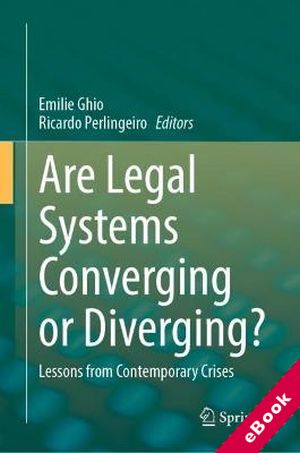
The device(s) you use to access the eBook content must be authorized with an Adobe ID before you download the product otherwise it will fail to register correctly.
For further information see https://www.wildy.com/ebook-formats
Once the order is confirmed an automated e-mail will be sent to you to allow you to download the eBook.
All eBooks are supplied firm sale and cannot be returned. If you believe there is a fault with your eBook then contact us on ebooks@wildy.com and we will help in resolving the issue. This does not affect your statutory rights.
This book focuses on two main aspects: legal convergence and crises. Despite the abundance of literature on legal convergence over the years, the question of whether legal systems are converging or diverging remains unanswered. This book provides a valuable contribution to questions concerning comparative law, legal convergence, and legal transplants by examining them through the lens of crises.
Crises challenge countries' legal systems and prompt institutional responses to tackle perceived shortcomings in the law. The crises witnessed by the world over the last two decades have highlighted two seemingly contradictory tendencies:
This book aims to determine whether, in times of crisis, foreign laws, rules, and concepts can transcend countries' domestic legal systems, or whether states' responses to crises lead to legal divergence and disintegration.
Unlike traditional studies on convergence, this edited volume takes an international and cross-thematic approach, with chapters focusing on how legislation in selected jurisdictions has responded to crises. Therefore, the book's originality lies in its truly global nature, with chapters and authors surveying jurisdictions in Africa, North and South America, Asia, Europe and Oceania. The breadth of legal areas covered, with a mix of private and public law, also add to its uniqueness.
From Russia to Germany and from bankruptcy law to environmental law, the book examines whether, as a result of crises, policy and legal responses have adopted, copied, or implemented features, policies, principles and/or rules from other legal systems (convergence), or have departed from existing legal norms, adopting policies and rules that differ from those of other countries (divergence).